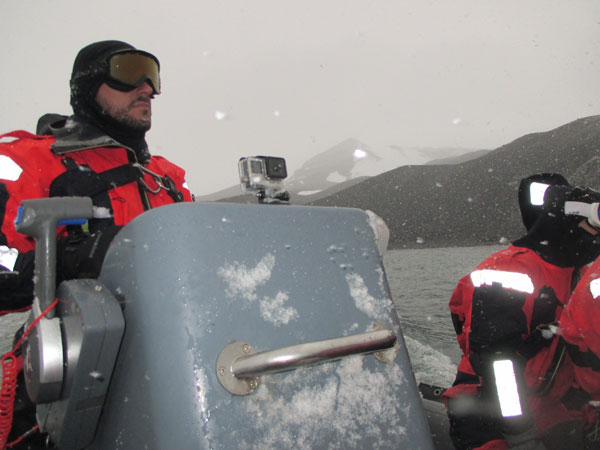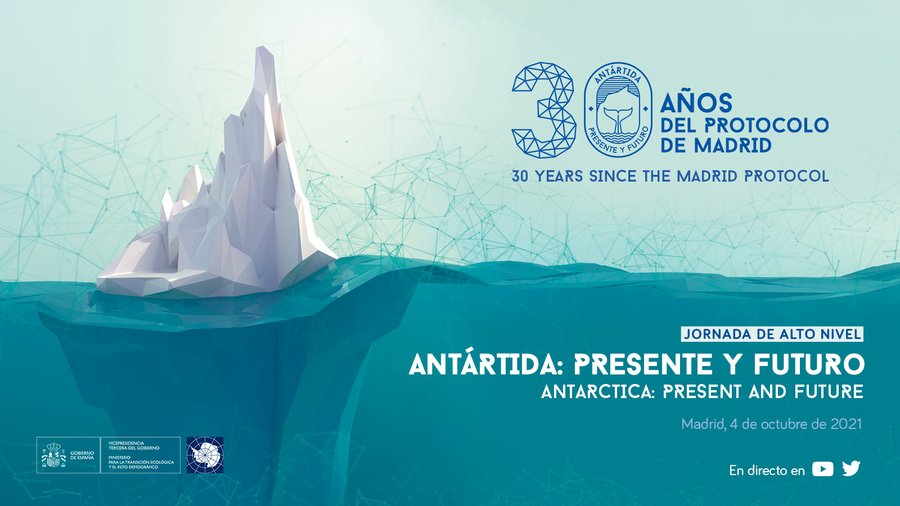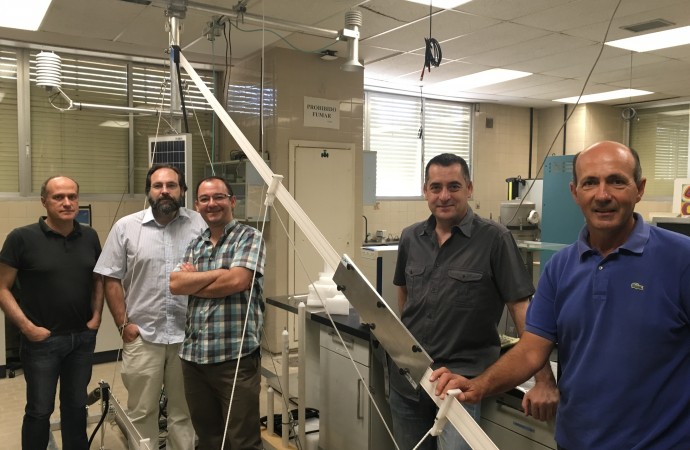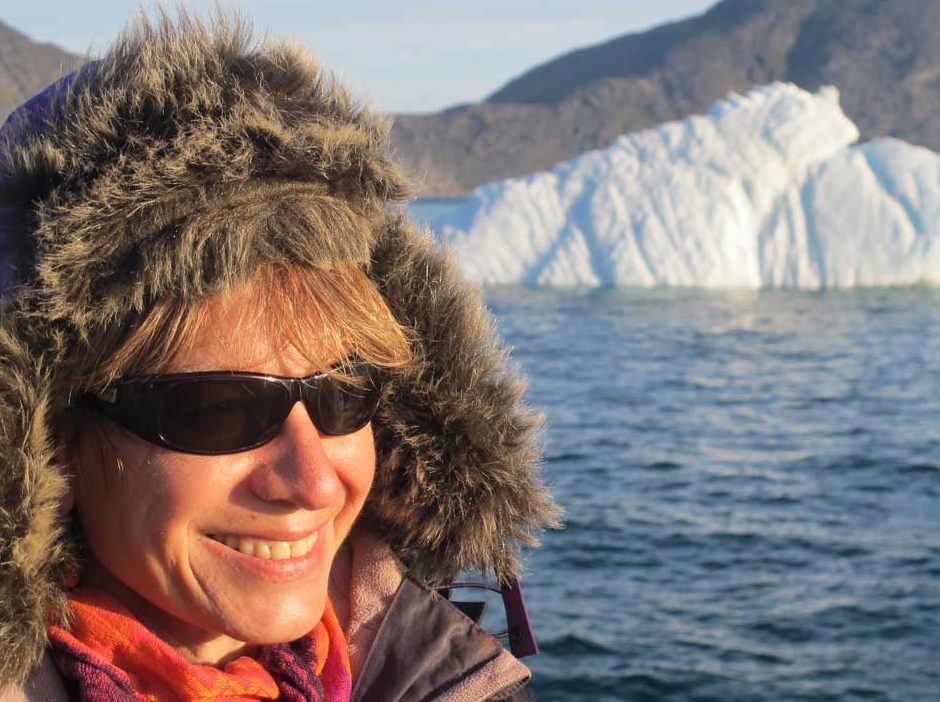
Day 72, Sunday, January 15, 2017, Deception Island.
Hello families! Are you overwhelmed by the month of January? Do you have at home a troublesome teenager? No problem. Send them here for a couple of weeks and soon we will set them straight. Why? Because this place is all peace, and yet there isn’t a minute of calm; the work here is relentless and it all gets done without a cross word. I am writing from the Spanish Army Antarctic Mission, at the heart of the volcano on Deception Island, from the Gabriel de Castilla base, which is key to the Spanish Antarctic program.
The scientific program this year has broken all records. The people responsible for the Spanish Polar Committee warned us during the preparatory meetings: “It is the longest, more complex, and ambitious campaign of all undertaken so far”. Someone said to me: “you are lucky: you’ll see a bit of everything”. The prophecy is being fulfilled: “God shuffles the cards of destiny”, said René Lavand, and he has put me at the front row in order to fulfil my mission – “Travel to see, see to understand, understand to share”. Seeing, understanding and sharing this adventure of the sciences which will last five months, from November 2016 to March 2017.
This week we are half way there, at the equator. Seventy days have passed during which I have travelled through a rollercoaster of emotions and feelings. I have crossed the seven peaks of Deception volcano, while enjoying panoramic views of penguins, seals and whales. I have drunk iceberg water, touched the skin of the volcano, felt the caress of the snow and the anger of the wind on my own face.
On balance, so far it has been a formidable trip. The sea crossing from Vigo to Tierra del Fuego, aboard the research vessel Sarmiento de Gamboa, whose endearing crew were my family for two months, including a memorable Christmas Eve, in which there were Christmas gifts for all was truly fantastic. With them I crossed the Strait of Magellan twice, with the same emotion that Juan Sebastián Elcano probably felt aboard the ship La Trinidad. Then there followed days full of laughter, roses, and red beer in Punta Arenas. Later, we crossed Drake passage or “Mar de Hoces” if you prefer, although the poor Francisco de Hoces (1525), rather than discovering this crossing was lost around Cape Horn and sailed lost, weathering storms until he managed to return to the continent.
During these past few months, I’ve crossed four times Drake Passage, and the four times with good weather; calm seas and excellent visibility. On the first trip, we carried to Livingston Island and Deception Island a voluminous cargo (food, technical equipment and building materials), and the staff needed for the opening of the two scientific bases. Then, we returned along the Beagle Channel to Tierra del Fuego, touching port at the city of Ushuaia. While I was there, I visited peat bogs, beaver dams and unspoiled places, such as Laguna Esmeralda and Lapataia Bay. Add the fact that it was there where Darwin himself came up with the theory of evolution, and coupled this with the place’s own natural beauty, it gives Tierra del Fuego a special place in the history of humanity.
During the past few weeks, I have also visited King George Island, the Chilean, Russian and Korean bases, and Villa Las Estrellas, which is the most southern city in the world. We crossed Drake Passage again, this time carrying soldiers, more researchers, editors, and more materials to finish the new base Juan Carlos I and to build a warehouse on Deception Island. There, with the materials we carried, members of the Cobra team tightened ropes, traced the lines of the new building on the slippery floor made of tephra, or nailed rods in soil harder than steel: frozen permafrost. Every day’s job is to ensure that the bases run like clockwork, and that the scientific teams can do their job. This is the main objective of this intense Antarctic campaign.
Once we crossed the equator, the second phase and the hardest begins: the days are becoming shorter and the nights longer; and what is worse, it is getting colder. We are changing seasons, from summer to autumn. This week, we get new groups of researchers and the bases, already saturated, are overflowing with people. The igloo where I live (cramped, I have to try not to hit the head against the ceiling, and with five blankets on top of me) I have to share with another four people. But, there is no room for complaint though: we adapt ourselves to the situation, aware of the privilege that it is living in an igloo, on Deception Island, while listening to the breathing of the volcano.
And this week, at long last, the research vessel Hespérides of the Spanish Navy comes into action. It brings new reinforcements, more materials, and more research projects. Long sea trips ahead of us along the coast of the continent, the Strait of Bransfield, the Gerlache Strait, Cierva Cove… but all this is fine because we will be with the very hospitable Spanish crew, who are a worthy heir of Elcano, Sarmiento de Gamboa, Gabriel de Castilla, Malaspina and Gravina.
Ahead of us, we still have two months of listening and trying to understand every day a new aspect of the hugely complex scientific tasks carried out all the time here. The PERMASNOV project, a study on the thermal evolution of the frozen ground, the ALIENANT project, a study about the presence of non-native species in Antarctica, the study of glaciers themselves, the study of geomagnetic and ionospheric activity, and a meteorology study. Then, there are also tests carried out with proofs gathered from the European satellite Galileo, geothermal, geodetic, and oceanographic time series; or the study of parasites, or the immune response and the behaviour of penguins looking for food. These are just some of the projects, but the list is endless: climate change through the study of algae, divers in search of DNA samples, palaeomagnetism… And on top of that, they are building new modules and stores on the established bases; welcoming researchers from Portugal, Chile, and Argentina; sponsoring penguins in schools; eliminating waste following a demanding environmental protocol…, in short, this is the most ambitious and powerful polar campaign in the last thirty years.
This is a quick summary, midway through my trip to Antarctica, it is a summary of what I have lived and felt and metabolized, knowing that the worst is still to come. And yes, Antarctica is tough but wonderful. For all those parents with moaning teenagers out there, send them here for a couple of weeks, and they will soon change for the better. And you, young people that have at home parents who are unable to get emancipated: send them to Antarctica without a return ticket.








 Base Gabriel de Castilla en Isla Decepción
Base Gabriel de Castilla en Isla Decepción Blog PERMASNOW – Universidad de Alcalá
Blog PERMASNOW – Universidad de Alcalá British Antarctic Survey
British Antarctic Survey Caminando entre pingüinos
Caminando entre pingüinos El blog de Rosa M. Tristán
El blog de Rosa M. Tristán The Antartic Report
The Antartic Report